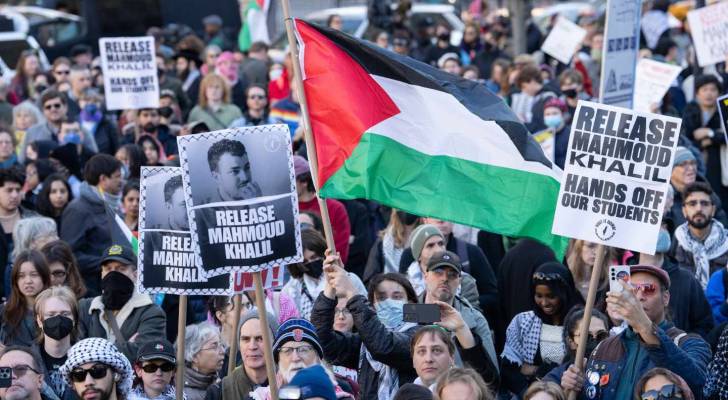Protesters gather in Manhattan’s Foley Square on March 10, 2025, to protest the arrest of Mahmoud Khalil.
Pro-'Israel' groups gave protester list to Trump; full deportation story
In the wake of the October 2023 event and 'Israel’s' military aggression in Gaza, Ross Glick, a pro-'Israel' activist, began receiving a flood of tips, and emails packed with photos, videos, and personal information about students and faculty participating in pro-Palestinian protests across US college campuses.
By the time he joined Betar USA, a New York-based Zionist advocacy group, the groundwork was already laid. Betar began collecting and organizing the data into dossiers. Their goal: was to flag protesters they allegedly crossed the line from free speech to promoting hate or incitement against Jews.
Now, months later, Betar claims it handed over those names to the Trump administration, which has already begun arresting and deporting some noncitizen protesters under a sweeping executive order aimed at “combatting antisemitism.”
“We submitted the names of hundreds of protesters and activists to the Trump administration... urging ICE to deport them,” said Betar spokesperson Daniel Levy.
Betar’s campaign has raised alarms among civil liberties advocates and students’ supporters, who call it a dangerous blurring of lines between national security and political dissent.
Deportation fears grip campuses
Among those affected is Mahmoud Khalil, a legal permanent US resident and former student leader at Columbia University. He was arrested in March after being accused, without evidence, of leading Hamas-aligned activities — a claim his lawyers strongly deny.
Betar had named him publicly just weeks earlier. His legal team says the group’s online profile falsely portrayed him as an extremist, part of what they describe as a "dehumanizing doxing campaign."
“I haven’t been able to sleep, fearing that ICE or a dangerous individual might come to my home,” Khalil wrote in an email to Columbia, the day before his arrest.
He wasn’t alone.
Rumeysa Ozturk, a Tufts University doctoral student, was taken by immigration officials in late March. Her supposed offense? Writing critically about 'Israel' in her campus newspaper. She has not been charged with any crime.
Online, she was profiled by Canary Mission, another group known for naming pro-Palestinian activists. Her brother accused the site of “terrorizing supporters of Palestine” and suppressing basic freedoms.
Tech, surveillance, and chilling speech
Betar’s founder Ross Glick says their dossiers are built using facial recognition, AI, and open-source data — everything from social media to news clips. The result: a digital archive of campus dissent, ready for government review.
But critics warn of a dangerous precedent — one where student protesters exercising their constitutional rights are hunted by proxy, through private groups with political agendas.
“If the government acts on this information to punish people for legal activity, that’s the real problem,” said Sophia Cope of the Electronic Frontier Foundation.
Whether federal agencies are officially using Betar’s files remains unclear. The State Department won’t say. The Department of Homeland Security (DHS) denies receiving tips directly from Betar or Canary Mission. Still, arrests continue.
A new kind of surveillance
For some, this isn’t just a political crackdown. It’s a high-tech blacklist that outsources surveillance and punishes activism. The collateral damage is real: harassment, threats, reputational harm, and now, deportations.
Free speech advocates are calling it what it is: a test of American democracy.
As one student put it after being profiled online:
“They didn’t just try to silence me. They tried to erase me.”




